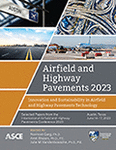Stability of Repurposed Plastics in Asphalt Binder
Publication: Airfield and Highway Pavements 2023
ABSTRACT
Five types of waste plastic streams were investigated for their compatibility with a PG 64-22 asphalt binder. The waste plastics included high-density polyethylene (HDPE) pails; low-density polyethylene (LDPE) food packaging waste; polypropylene (PP) from various waste sources, such as plastic cups, medicine bottles, blackboards, and whiteboards; polystyrene (PS) from food packaging; and plastic number 7 from various sources, including polycarbonate, CD cases, and polycarbonate fibers. The plastics were characterized using Fourier-transform infrared spectroscopy (FTIR). Thermogravimetric analysis was performed to optimize the blending. Storage stability of waste plastic–modified binders was evaluated using the cigar tube test (CTT). Rheological and multiple stress creep recovery (MSCR) tests were performed for predicting rutting and cracking potential. No significant chemical changes were noticed when plastics were added to the binder. However, some of the waste plastic–modified binders appeared to be unstable. The rheological properties of waste plastic–modified binder vary with respect to unmodified binder; most plastics exhibited degradation. The MSCR test showed no improvement in the elasticity of the nonrecoverable strain for tested waste plastic–modified binders. This suggests that wet mixing of waste plastic with binder could be ineffective in some cases.
Get full access to this article
View all available purchase options and get full access to this chapter.
REFERENCES
Al-Hadidy, A. I., and Yi-qiu, T. (2011). Effect of styrene-butadiene-styrene on asphalt and stone matrix asphalt mixture properties. Civil Engineering, 23(4).
Dalhat, M. A., and Al-Abdul Wahhab, H. I. (2017). Performance of recycled plastic waste modified asphalt binder in Saudi Arabia. International Journal of Pavement Engineering, 18(4), 349–357.
Dongré, R., D’Angelo, J., Reinke, G., and Shenoy, A. (2004). New criterion for Superpave high-temperature binder specification. Transportation Research Record, 1875(1), 22–32.
Ellis, C., Widyatmoko, I., and Read, J. M. (1997, April). The storage stability and behaviour of polymer modified bituminous binders. In Second European Symposium on the Performance and Durability of Bituminous Materials, Leeds.
Elseifi, M. A., Flintsch, G. W., and Al-Qadi, I. L. (2003). Quantitative effect of elastomeric modification on binder performance at intermediate and high temperatures. Journal of Materials in Civil Engineering, 15(1), 32–40.
EPA. Advancing Sustainable Materials Management: Facts and Figures 2016 and 2017. US Environmental Protection Agency, Washington, D.C., 2019.
García Mainieri, J. J., Al-Qadi, I. L., and Ghabchi, R. Effects of Waste High-Density Polyethylene on Asphalt Binder and Airfield Mixes. Under preparation.
Geyer, R., Jambeck, J. R., and Law, K. L. (2017). Production, use, and fate of all plastics ever made. Science Advances, 3(7), e1700782.
Hale, A., Macosko, C. W., and Bair, H. E. (1991). Glass transition temperature as a function of conversion in thermosetting polymers. Macromolecules, 24(9), 2610–2621.
Ho, S., Church, R., Klassen, K., Law, B., MacLeod, D., and Zanzotto, L. (2006). Study of recycled polyethylene materials as asphalt modifiers. Canadian Journal of Civil Engineering, 33(8), 968–981.
Ma, Y., Wang, S., Zhou, H., Hu, W., Polaczyk, P., Zhang, M., and Huang, B. (2021). Compatibility and rheological characterization of asphalt modified with recycled rubber-plastic blends. Construction and Building Materials, 270, 121416.
Masad, E., Roja, K. L., Rehman, A., and Abdala, A. (2020). A review of asphalt modification using plastics: a focus on polyethylene. Texas A&M University: Qatar, Doha.
NAPA (National Asphalt Pavement Association). (2020). The asphalt pavement industry fast facts. National Asphalt Pavement Association.
Singhvi, P., García Mainieri, J. J., Ozer, H., Sharma, B. K., and Al-Qadi, I. L. (2020). Effect of chemical composition of bio-and petroleum-based modifiers on asphalt binder rheology. Applied Sciences, 10(9), 3249.
Willis, J. R., Turner, P., Plemmons, C., Rodezno, C., Rosenmayer, T., Daranga, C., and Carlson, D. (2013). Effect of rubber characteristics on asphalt binder properties. Road Materials and Pavement Design, 14(sup2), 214–230.
Xu, F., Zhao, Y., and Li, K. (2022). Using waste plastics as asphalt modifier: A review. Materials, 15(1), 110.
Zani, L., Giustozzi, F., and Harvey, J. (2017). Effect of storage stability on chemical and rheological properties of polymer-modified asphalt binders for road pavement construction. Construction and Building Materials, 145, 326–335.
Information & Authors
Information
Published In
History
Published online: Jun 13, 2023
ASCE Technical Topics:
Authors
Metrics & Citations
Metrics
Citations
Download citation
If you have the appropriate software installed, you can download article citation data to the citation manager of your choice. Simply select your manager software from the list below and click Download.
